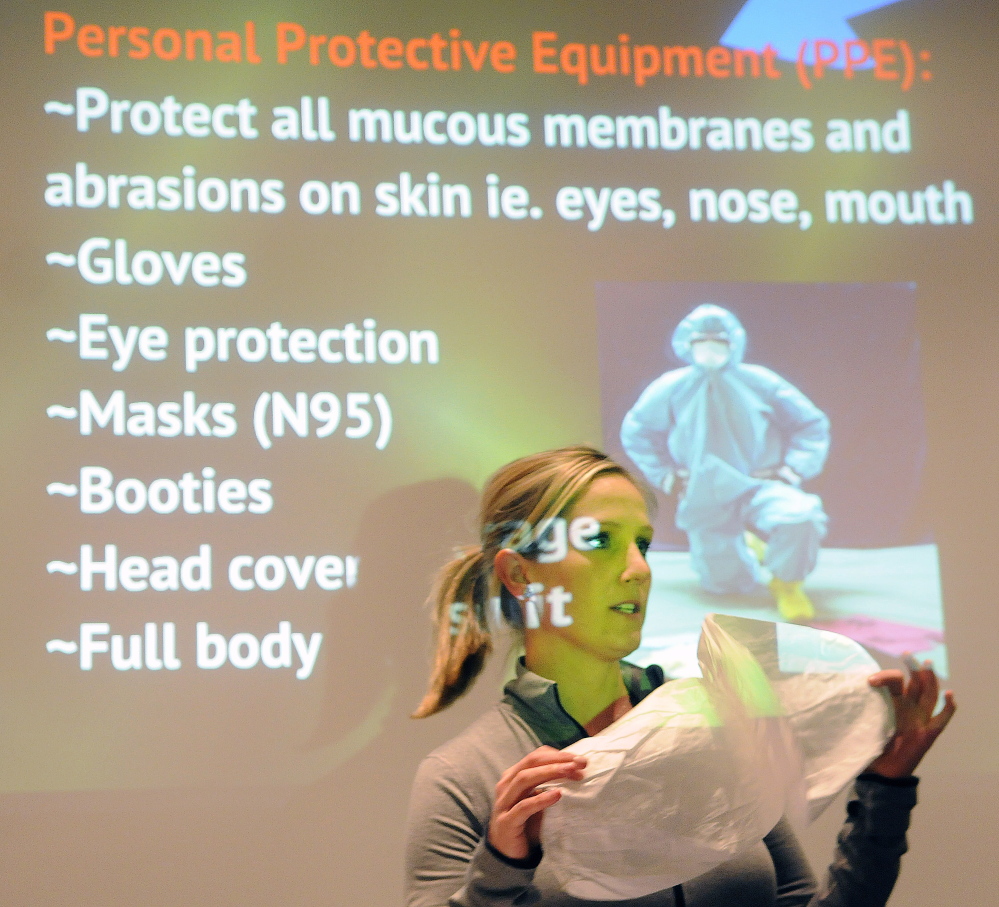When tenants leave behind blood, mold and other substances, units must be cleaned carefully.
AUGUSTA — When a tenant dies alone and it goes undiscovered long enough for the body to decompose, or a tenant is killed in a violent, bloody crime or just lets the apartment become littered with feces, it can leave a horrific mess to clean up.
But often what a landlord faced with such a situation can’t see has the potential to be much worse.
There could be a wide variety of biohazards lurking beneath the carpet, on the walls or even on a ceiling fan, which in many cases will require cleanup by a licensed professional trained and equipped to deal with anything from HIV-infected pools of blood to a house three-quarters full of human waste.
Local landlords and housing professionals from across the state on Wednesday learned what to do to make sure a unit is cleaned properly and legally when biohazards are left behind in an apartment by someone who died, had a meth lab or allowed mold to grow so that it can be safely rented to a new tenant.
“Just because you don’t see it doesn’t mean it’s not there,” said Kerry Gilmore, the firm’s marketing director. “You just have to be prepared if you open a unit and there are biohazards present, and know what to do to keep yourself safe.”
Gilmore showed photographs of an apartment overseen by a housing authority in Massachusetts where a tenant had died and his body had decomposed. Other than some minor-looking carpet stains, the room didn’t look too bad.
Then she showed what was under the carpet: a huge, human-shaped black stain from body fluids that burned into the hardwood floor below the carpet. The fluids had leaked down into rafters and, Gilmore said, would have leaked down into the apartment below within another 24 hours.
About 15 people attended the session, including several from out-of town housing authorities.
The training session was organized by the Augusta Housing Authority in partnership with MaineHousing and Waterville Housing Authority and was meant to help landlords, property managers and others learn what they need to do to make sure their apartments are safe and legal to rent out following an unattended death, suicide, violent crime or other incident likely to leave behind biohazards.
Chris McMorrow, a local landlord and member of the board of directors of the Maine Apartment Owners and Managers Association, said he once had a diabetic tenant who left needles throughout the apartment and asked what he should do about that.
Gilmore suggested contacting a licensed medical disposal company to safely and legally dispose of the needles. She added that some fire departments pick them up.
Dan Morse, another representative from 24-Trauma/Restore, said if a landlord could be fined by the Occupational Safety and Health Administration if caught throwing needles into the trash.
McMorrow said he’s had a couple of tenants die in apartments, but there was no blood in the units in either case. He said family members of the tenants came in and cleaned the apartments, and “I really thought nothing of it.”
Morse said not every death requires a professional cleanup.
However, he and Gilmore warned that if an unseen biohazard is present in a unit where a tenant dies and family members clean up the unit and are exposed to that biohazard, the landlord could risk liability.
For such cleanups, a quick pass with a dust rag and vacuum cleaner just doesn’t cut it, said Amanda Bartlett, executive director of the Augusta Housing Authority, a quasi-municipal organization that distributes federal housing vouchers and provides other housing assistance in the area. She said landlords need to know how to properly dispose of blood or body fluids that may have seeped into walls, floors or the air.
Bartlett said suicide and unattended deaths occur fairly frequently.
The company that provided the expertise at the seminar, 24-Trauma/Restore, cleans up crime scenes and other difficult situations.
The firm’s work included the cleanup after a man recently barricaded himself in the Camden Rite Aid before shooting himself with a shotgun, at the Boston Marathon bombings and at U.S. Postal Service facilities after the anthrax incidents in 2001.
Keith Edwards can be contacted at 621-5647 or at:
kedwards@centralmaine.com
Twitter: kedwardskj
Send questions/comments to the editors.




Comments are no longer available on this story